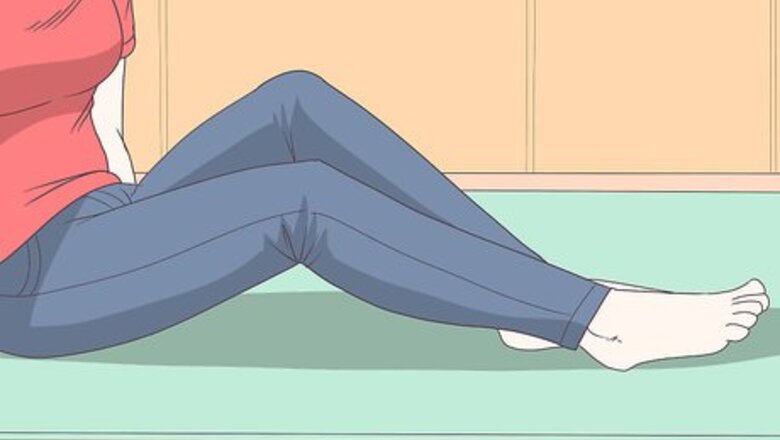
views
Obscuring Scars with Clothing and Bandages

Wear a pair of jeans or long pants to keep your leg scars hidden. Cover your leg scars completely by incorporating jeans or long pants into your daily outfit. Most jeans and pants go down to your ankles, so they’re a great option if you have scars on your thighs, knees, and lower calves. Men can try out blue jeans, chinos, or corduroy pants if they want to maintain a semi-casual look. Try out a pair of black jeans! They go well with many styles, including a blazer, casual jacket, or a tucked-in T-shirt.
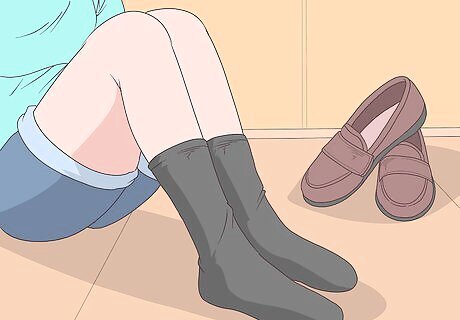
Opt for long socks if your scars are on your ankles or lower calves. Slip on some longer socks if you don’t want to cover up as much of your legs. They can come in many styles, like tube socks, which can be pulled over your ankles and the bottom of your lower calf. They can also be paired with fun pairs of shoes, like loafers. Consider wearing long socks with loafers, dress pants, and a flowy shirt.

Try a pair of tights if you want to wear a skirt or dress. Hide your scars with tights if you plan on wearing a skirt or dress. Tights can also help keep your legs warm during the chillier months, so you’ll be accomplishing two things at once. Depending on the look you’re going for, you can try dark tights or opt for hosiery that matches your skin tone more closely. If you want to wear tights but don’t want them to be super obvious, consider wearing a longer dress or skirt.

Go for leggings or sweatpants if you want to be comfortable. Obscure your scars with leggings and sweatpants if you want to prioritize comfort in your daily ensemble. There’s no shame in wearing these items, even if they might not win you professionalism points. They’ll do a great job at covering any scars on your thighs, calves, and knees. Yoga pants are another comfortable clothing option for you to consider, though they might not cover scars on your lower calves depending on the style you choose.
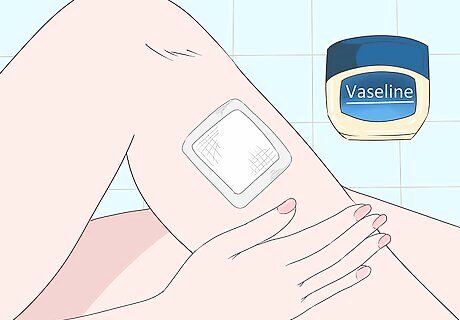
Cover the scars with a bandage in a pinch. Put on a bandage if your scars are concentrated on one area of your leg. If you were scarred recently, consider spreading a thin layer of petroleum jelly over the scar before covering it with a piece of gauze or a sterile pad. Don’t tear away scabs from cuts and blemishes on your legs. This increases your risk of having a visible scar.
Applying Makeup to Conceal Scars
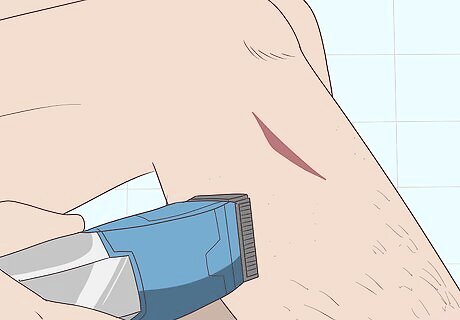
Shave the scarred area to ensure that it’s smooth. Use an electric or disposable razor to remove any hair from the scarred area of your leg. Be sure to apply shaving cream beforehand, even if you’re only shaving a small spot. The smoother your skin is, the easier it will be to apply makeup.

Exfoliate your skin before moisturizing it. Keep your skin fresh by rubbing some exfoliator into your skin, which will remove any dead skin cells. Once you’ve washed off any of the excess product, spread some moisturizer over the exfoliated area. Try to avoid products with perfume, as these may irritate your skin. If your legs are exposed to sunlight frequently, consider using a moisturizer with SPF. Check your local drugstore to find an exfoliator and moisturizer for your specific skin type. Some products cater specifically to oily or dry skin, as well as other conditions.
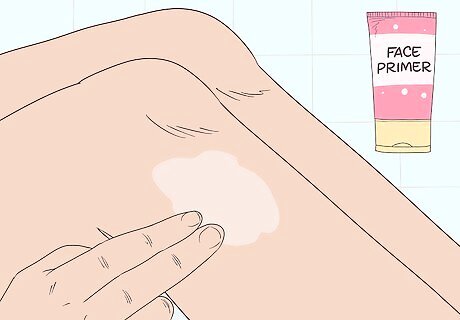
Spread some primer onto your skin to prepare it for the foundation. Use your fingers to rub on a thin layer of primer over the scars on your legs. This will provide a sturdy base for the foundation and any other products you want to apply. Ask your dermatologist if you should be applying any medicated ointments to your scars to help them fade. You’ll be using the same primer that you’d use on your face.
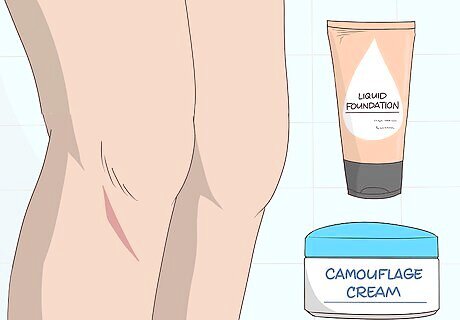
Choose the right makeup formula for your skin. Decide whether or not you want to cover your leg scars with liquid foundation or with a thicker camouflage cream. If your scar has an indentation, consider opting for a creamier product. Use BB cream, or blemish balm, to moisturize your skin and cover less obvious leg scars. Try a spray-on foundation instead of a liquid formula if you want a less messy application. Consider tanning or bronzing sprays as options to cover your scars.
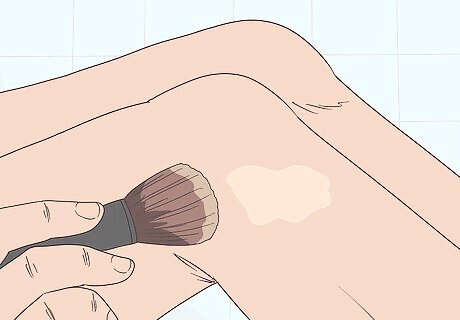
Dab or spray on some liquid foundation that matches your skin tone. Use a wide brush or makeup sponge to pat some foundation onto the primed area. Start with a pea-sized amount—you can always add more product later if you need to! Make sure that the scar has healed before you apply any makeup. Bend your leg when you’re applying makeup to your knee or ankle so the application looks as smooth as possible.
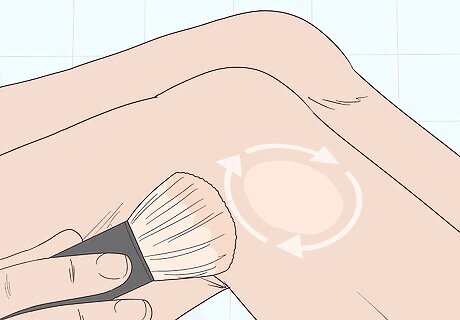
Feather around the foundation to blend it into your skin. Take a large foundation brush or a makeup sponge and buff around the edges of the makeup to make it look uniform with the rest of your leg. Make sure to feather in an outward direction, using small, light buffing motions as you go.
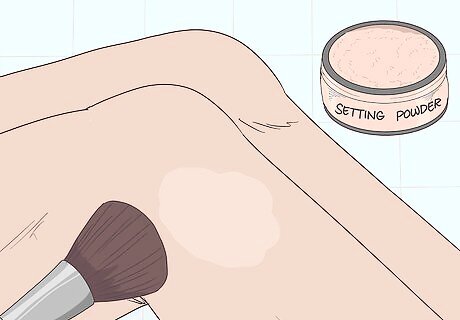
Pat some setting powder onto the makeup. Add some setting powder to the scarred area to help keep the makeup in place. Consider this powder as a seal, or a layer of protection for your foundation and other products.
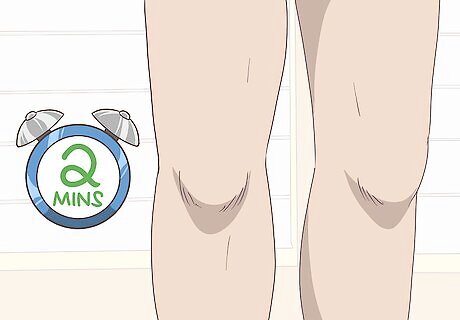
Let the makeup set before you go out. Wait for your makeup products to completely dry before you go anywhere. Don’t put on any pants, shorts, or skirts until you’re positive that the makeup won’t smear. Wait 1-2 minutes if you want to play it safe.
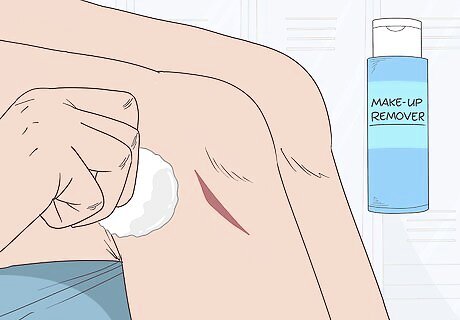
Use makeup remover and a cotton ball to wipe off your makeup. Take a cotton ball and dip it into a delicate makeup removal solution. Clean off the makeup in long strokes until there is no more product on your skin. If you’d prefer, you can also dip your fingers in makeup removal solution and rub off the makeup from your leg scars.
Covering Scars with Tattoos

Plan what kind of tattoo you want. Brainstorm ideas by doing an image search online, or by looking at the digital portfolios of different tattoo artists. Keep in mind that the tattoo will be permanent, so make sure that it’s something you’ll enjoy having on your skin for the rest of your life. Visualize the tattoo you want for at least a year, so you can see how you feel about the design after some time has passed. If you have a series of small scars on your legs, consider getting a longer and more expansive tattoo, like a flowery vine. If your scar is centered in a single spot, think about a design that can cover it completely, like a portrait.

Book an appointment to get the tattoo. Call ahead or walk into a tattoo parlor to schedule an appointment for your body art. Check online ahead of time to make sure that the parlor has good reviews, and that the employees are credible. Ask to see if any of the tattoo artists have experience with covering up leg scars. Depending on the size and intricacy of your tattoo, it may end up costing several hundred dollars. Don’t try and find artists who are especially cheap—there’s a likely reason they don’t charge a lot, and it probably isn’t good. In most places, you have to be 18 to get any body art done. If you’re a minor, make sure you have a parent or guardian’s permission before you get tattooed. Know the consequences, and how it might impact your ability to donate blood. Depending on where you live, getting a tattoo might disqualify you from giving blood. Check with your local hospital or donation center to check.

Speak with your tattoo artist before the procedure. Talk to the artist so you know exactly what’s going to happen. Don’t be afraid to ask questions about the procedure, and be sure to let the artist know that the purpose of the tattoo is to obscure your leg scars. If you get any negative vibes from the tattoo artist, don’t be afraid to leave.

Follow the after-care instructions carefully. Keep your new tattoo covered with a medicated bandage, and clean the skin with a gentle soap. Additionally, make sure that your ink doesn’t get wet in the first two weeks after you receive the tattoo. The after-care helps to keep your skin as healthy and comfortable as possible. You can usually purchase tattoo-specific soaps at your tattoo parlor.




















Comments
0 comment